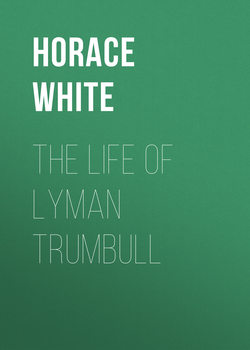Читать книгу The Life of Lyman Trumbull - Horace White - Страница 1
PREFACE
ОглавлениеA few years since, the widow of Lyman Trumbull requested me to write a biography of her husband, who was United States Senator from Illinois during the three senatorial terms 1855-1873, or to recommend some suitable person for the task. It had been a cause of surprise and regret to me that the name of Trumbull had not yet found a place in the swelling flood of biographical literature that embraces the Civil War period. Everybody, North or South, who stood on the same elevation with him, everybody who exercised influence and filled the public eye in equal measure with him, had found his niche in the libraries of the nation, and such place in the hearts of the people as his merits warranted. Trumbull alone had been neglected. I reflected upon the matter and came to the conclusion that, although better writers than myself could be found for this kind of work, no one was likely to be found who had been more intimate with him during his whole senatorial career, or who had warmer sympathy for his aims or higher admiration for his abilities and character. I reflected also that very soon there would be no person living possessing these special qualifications. Accordingly I decided to undertake the work.
Mrs. Trumbull placed in my hands several thousand letters received by Trumbull, and a few written by him, during his public career. All these have been examined by me, and they are now in the Library of Congress. He was not in the habit of keeping copies of letters written by himself unless he deemed them important, and such copies were generally written out by his own hand, not taken in a copying-press. Other letters written by him have been sought with varying success in the hands of his correspondents, or their heirs, in various parts of the country, but nothing has been found in this way that can be considered of much importance.
During the Reconstruction era I had sustained the policy of Congress in opposition to that of Andrew Johnson, but had revolted at the carpetbaggery and misgovernment which had ensued, and had abhorred the "Ku-Klux" bills and "Force" bills which the Union party for a long time continued to enact or threaten. I was not quite prepared to find, however, upon going over the whole ground again, that I had been wrong from the beginning, and that Andrew Johnson's policy, which was Lincoln's policy, was the true one, and ought never to have been departed from. This is the conclusion to which I have come, after much study, in the evening of a long life. This does not mean that all of the doings and sayings of President Johnson were wise and good, but that I believe him to have been an honest man, a true patriot, and a worthy successor of Lincoln whose Reconstruction policy he followed. Lincoln himself could not have carried that policy into effect without a fight, and many persons familiar with the temper of the time think that even he would have failed. All that we can now affirm is that he was armed with the prestige of victory and the confidence of the North, and hence would have been better prepared than Johnson was for meeting the difficulties that sprang up at the end of the war. It must be admitted, however, that Johnson honestly aimed to carry out that policy, both because it was Lincoln's and because he himself, after careful consideration, esteemed it sound.
I acknowledge my indebtedness to the Diary of Gideon Welles, which I regard as the most important contribution to the history of the period of which it treats that has yet been given to the public. The history of Mr. James Ford Rhodes I have found to be an invaluable guide, as to both facts and judgments of men and things. I am indebted to Professor William A. Dunning, of Columbia University, for valuable suggestions, criticism, and encouragement, as well as for the assistance derived from his admired writings on Reconstruction. Miss Katherine Mayo has lightened my labors greatly by her intelligent and indefatigable search of old letters and newspaper files and by interviews with persons still living. My gratitude is due also to the late William H. Lambert, of Philadelphia, for giving me access to his collection of manuscript correspondence that passed between Lincoln and Trumbull prior to the inauguration of the former as President; also to Dr. William Jayne, of Springfield, Illinois, to Hon. J. H. Roberts, of Chicago, to the wife of Walter Trumbull (now Mrs. L. C. Pardee, of Chicago), and to Mrs. Mary Ingraham Trumbull, of Saybrook Point, Connecticut.
H. W.
